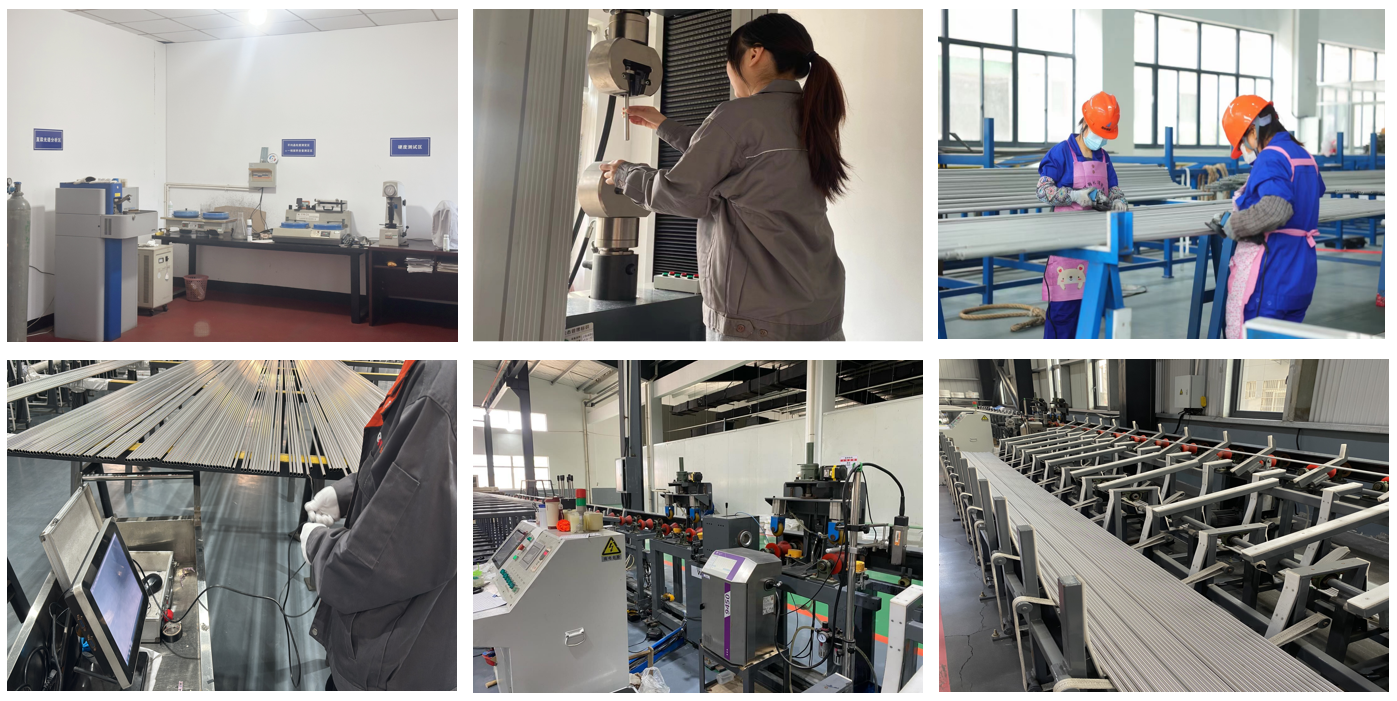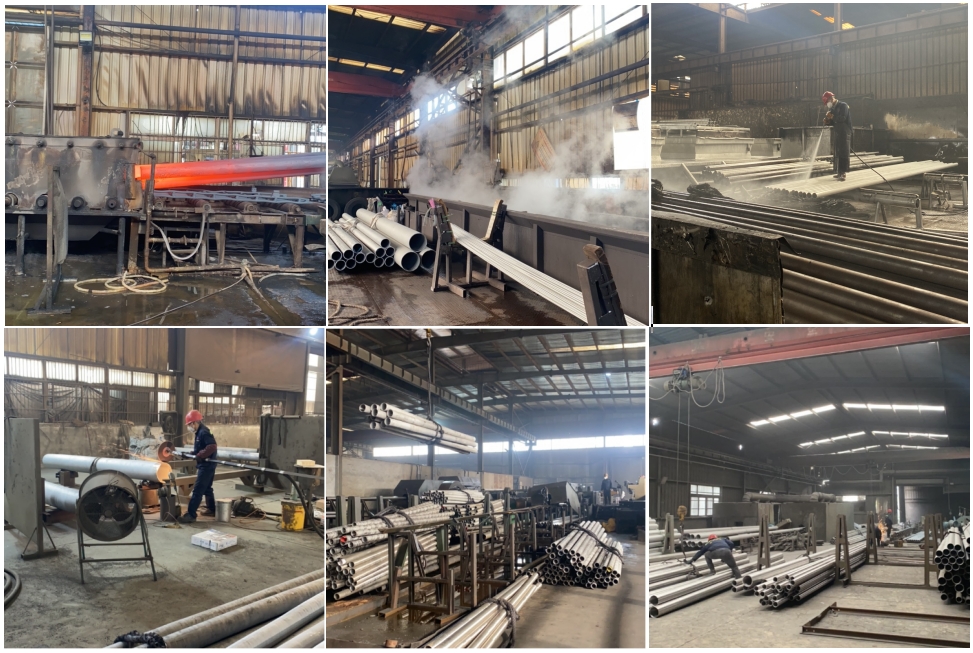| Availability: | |
|---|---|
| Quantity: | |
Process: BA (Bright Annealing)
The automotive condenser is a key heat exchange component in the vehicle's air conditioning system, responsible for condensing the high-temperature, high-pressure gaseous refrigerant from the compressor into liquid. Its piping requires excellent corrosion resistance, high-pressure resistance, thermal conductivity, and processability.
Excellent corrosion resistance: The addition of Mo significantly enhances the stainless steel's resistance to pitting and crevice corrosion caused by chloride ions. Automobiles are exposed to chloride-rich media such as de-icing salt, seawater mist, and road dust, which ordinary 304 stainless steel and even aluminum pipes struggle to withstand over the long term.
Resistance to stress corrosion cracking (SCC): Austenitic stainless steel can suffer from stress corrosion cracking (SCC) under the combined effects of chloride ions and tensile stress. 316L's SCC resistance significantly outperforms the 304 series, making it more suitable for operation in high-pressure and vibration environments.
High Strength and Pressure Resistance:Stainless steel boasts far greater strength than aluminum alloy, enabling it to withstand the higher operating pressures within air conditioning systems. This allows for thinner tube walls, ensuring safety while also reducing weight.
Seamless tube construction eliminates weld seams, resulting in uniform overall strength and eliminating potential weaknesses associated with welding. This provides enhanced pressure resistance and exceptional reliability.
Excellent Machinability and Formability:Austenitic stainless steel exhibits excellent ductility and toughness, making it easy to process in various processes, such as bending, flaring, and shrinking, making it suitable for manufacturing condenser coils with complex shapes.
Long Service Life: In harsh environments (such as coastal areas with high humidity and salinity, or areas where de-icing agents are frequently used in winter), 316L stainless steel condensers offer a lifespan far exceeding that of aluminum condensers, practically equal to the lifespan of the vehicle, eliminating the hassle and cost of replacing condensers due to corrosion and leakage.
High-end brand vehicles: These require extremely high component lifespan and reliability.
Specialty and commercial vehicles: These vehicles, such as construction vehicles, port vehicles, and offshore platform vehicles, operate in extremely harsh environments. Vehicles exported to specific regions, such as the Middle East and Northern Europe, use deicing agents, or are destined for coastal areas.
Systems using new high-pressure refrigerants place even higher pressure requirements on piping.
316L seamless stainless steel tubing is the top material choice for manufacturing high-performance, long-life, and highly reliable automotive condensers. Its unparalleled corrosion resistance and high strength perfectly address the challenges of traditional materials in harsh operating conditions. While initially costly, the reduced lifecycle costs and enhanced brand reputation it brings make it an irreplaceable choice in high-end and specialty vehicle manufacturing.
Process: BA (Bright Annealing)
The automotive condenser is a key heat exchange component in the vehicle's air conditioning system, responsible for condensing the high-temperature, high-pressure gaseous refrigerant from the compressor into liquid. Its piping requires excellent corrosion resistance, high-pressure resistance, thermal conductivity, and processability.
Excellent corrosion resistance: The addition of Mo significantly enhances the stainless steel's resistance to pitting and crevice corrosion caused by chloride ions. Automobiles are exposed to chloride-rich media such as de-icing salt, seawater mist, and road dust, which ordinary 304 stainless steel and even aluminum pipes struggle to withstand over the long term.
Resistance to stress corrosion cracking (SCC): Austenitic stainless steel can suffer from stress corrosion cracking (SCC) under the combined effects of chloride ions and tensile stress. 316L's SCC resistance significantly outperforms the 304 series, making it more suitable for operation in high-pressure and vibration environments.
High Strength and Pressure Resistance:Stainless steel boasts far greater strength than aluminum alloy, enabling it to withstand the higher operating pressures within air conditioning systems. This allows for thinner tube walls, ensuring safety while also reducing weight.
Seamless tube construction eliminates weld seams, resulting in uniform overall strength and eliminating potential weaknesses associated with welding. This provides enhanced pressure resistance and exceptional reliability.
Excellent Machinability and Formability:Austenitic stainless steel exhibits excellent ductility and toughness, making it easy to process in various processes, such as bending, flaring, and shrinking, making it suitable for manufacturing condenser coils with complex shapes.
Long Service Life: In harsh environments (such as coastal areas with high humidity and salinity, or areas where de-icing agents are frequently used in winter), 316L stainless steel condensers offer a lifespan far exceeding that of aluminum condensers, practically equal to the lifespan of the vehicle, eliminating the hassle and cost of replacing condensers due to corrosion and leakage.
High-end brand vehicles: These require extremely high component lifespan and reliability.
Specialty and commercial vehicles: These vehicles, such as construction vehicles, port vehicles, and offshore platform vehicles, operate in extremely harsh environments. Vehicles exported to specific regions, such as the Middle East and Northern Europe, use deicing agents, or are destined for coastal areas.
Systems using new high-pressure refrigerants place even higher pressure requirements on piping.
316L seamless stainless steel tubing is the top material choice for manufacturing high-performance, long-life, and highly reliable automotive condensers. Its unparalleled corrosion resistance and high strength perfectly address the challenges of traditional materials in harsh operating conditions. While initially costly, the reduced lifecycle costs and enhanced brand reputation it brings make it an irreplaceable choice in high-end and specialty vehicle manufacturing.





